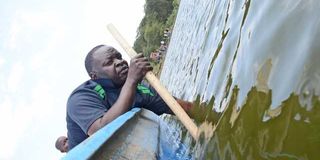A guardian angel in waters of death

Mr David Kilo during a rescue mission in Lake Naivasha. PHOTO | POOL
What you need to know:
- His toughest call was during an operation to retrieve bodies of chopper crash victims in Lake Nakuru on October 21, 2017.
By the time he was in Class Eight, he was helping in rescue missions and recovery operations in Lake Naivasha.
Almost every chief and Naivasha residents has his phone number. Mr David Kilo knows way too well that he could receive a call any time asking him to go help rescue someone or recover a body from the waters.
A mention of his name after a drowning incident elicits hope, and to him, seconds and minutes are what have been dictating whether a rescue mission will bear fruit for the last 33 years.
His, in literal terms, is a life in the waters that has seen the unassuming lake operator suffer heartbreaks seeing life lost inside lakes and rivers.
“I have been a volunteer rescuer for years and I can tell you that without strong will, it is not a walk in the park,” says Mr Kilo, 49.
From rescuing victims of capsized boats and hippo mauling, the boat operator has developed a thick skin. “I am now toughened if only for my volunteer rescue mission,” adds Mr Kilo.
His toughest call was during an operation to retrieve bodies of chopper crash victims in Lake Nakuru on October 21, 2017.
INTEREST IN DRIVING
“I was among the rescue team members involved in the exercise and, to date, that remains the most challenging encounter — there was no much headway despite all our efforts,” Mr Kilo says.
He notes that he developed interest in diving since he was young. It started with several swimming expeditions in Lake Victoria, when he would visit his maternal uncles in Nyanza.
“By 1979 when I was in Class Three at DEB Primary in Naivasha, I would dive deep into the waters. Gradually, people started seeking my help whenever a valuable fell in the waters,” he says.
By the time he was in Class Eight, he was helping in rescue missions and recovery operations in Lake Naivasha.
With time, he became famous and would be called to help with rescue operations in far-flung areas. Convinced that diving was going to be part of his life, he bought his own protective gear and trawled the internet for information about diving, rescue missions and dangers in waters.
In 2019 during Easter, Mr Kilo was among the rescuers who saved local tourists after their boat capsized in Lake Naivasha.
“All the tourists were wearing life saver jackets, and we also responded to the distress call in real time because the area was not far,” he explains. This incident gave him the impetus to continue with his volunteer work, which he draws inspiration from.
HORROR MOVIE
And there are incidents that Mr Kilo likens to a horror movie. One of them is the daring rescue of a flower farm worker, who was being mauled by a hippo near the shores of Lake Naivasha in May this year. “While paddling our boats, we heard screams and rushed to the scene only to find the man fighting with the gigantic mammal. We rowed the boat a few metres away and scared the animal before rescuing the dazed worker,” observes Mr Kilo.
Early this year, Mr Kilo was left devastated after a hippo attack victim died outside the casualty department at a local hospital.
“I drove him to the hospital hoping that he would be attended to and perhaps recover. Unfortunately, he lost the battle. I personally knew him and the memories still haunt me to date,” he says, adding that hippo attacks around the fresh water lake have been on the rise.
According to statistics from the Kenya Wildlife Service, at least six people have been killed since the beginning of the year, with two others being killed after the agency released the figures.
But Mr Kilo, who doubles up as the chairman of Lake Naivasha Boat Owners Association, puts the number of those mauled by hippos at 20.
He has been called upon to offer support in Nakuru, Laikipia, Nyandarua, Nairobi, Kiambu, and Kisumu among others. “It is one of the most energy sapping call of duty, more so watching relatives and friends break down in tears as bodies of their loved ones are brought ashore,” he admits.
Mr Kilo expresses concern over lack of trained rescuers around the lake. “I enrolled for training courses in order to sharpen my skills, but it can never be a one-man show. We need more people on board,” says Mr Kilo, adding that county governments should station trained rescuers in shores of lakes and equip them with necessary gear.
“Nakuru County government, for instance, should up its game and take care of lake users given the series of incidents that have continued to claim lives.”





